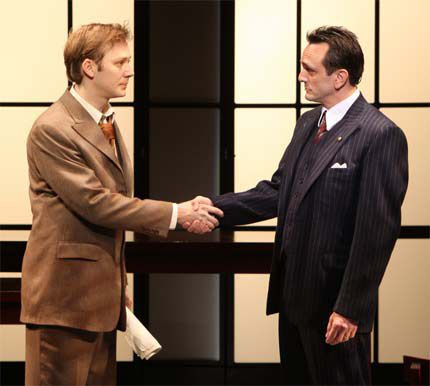Murky History of Television Gets Murkier

Scienctific research — an activity sometimes purely cerebral, sometime breathtakingly visceral — often gets poor handling when translated to an artistic medium.
One of the spate of actual plays running on Broadway now (as opposed to movie-derived musicals) should particularly interest scientists, or science buffs, "The Farnsworth Invention."
While the story should fascinate, and the effort be lauded, the show ultimately hamstrings itself with historical inaccuracies, plus unnecessary layering on of spectacle and hand-wringing melodrama.
Science — ostensibly the subject at hand here — is played down, disappointingly.
The two-act drama attempts to shed some light on the murky history of television, and its oft-neglected inventor, Philo T. Farnsworth, who demonstrated the first working electronic television in 1927.
The playwright, Aaron Sorkin, creator of the "West Wing" television series, casts the story as a David-vs.-Goliath battle between the youthful Farnsworth (Jimmi Simpson) and a formidable adversary in the person of David Sarnoff (Hank Azaria), with the corporate resources of RCA at his beck and call.
Directed by Des McAnuff ("The Who's Tommy") at a blistering pace, the scenarios are acted by a 19-member ensemble upon a dual-level set that facilitates scene changes. However, despite a 2-hour, 5-minute length, actual events have been compressed, concatenated and shuffled by Sorkin, and further altered with additions and emendations.
Sign up for the Live Science daily newsletter now
Get the world’s most fascinating discoveries delivered straight to your inbox.
Science short-shrifted
The play begins promisingly with the early development of Farnsworth, pointing up the prodigious scientific intellect which startlingly manifested in the son of a potato farmer growing up in Rigby, Idaho. At the age of 14 he conceived of the basic principles of electronically capturing an image and generating a television signal. The notion of creating an image by drawing horizontal lines came from his background in farming, plowing fields in parallel rows.
(Much of the earlier history of mechanical television pioneers is glossed over quickly in the introductory remarks by the fictional Sarnoff.)
What little scientific detail is mentioned serves mainly to set up easy laughs derived from the bewilderment of other characters around Farnsworth. Sadly, it is with these people that the audience most identify.
Quickly the story moves on to debates regarding the legal issues of patents and intellectual property rights, both important topics, but science is relegated to a secondary consideration. Bizarrely, though Farnsworth won his first courtroom patent battle with RCA (though later losses drained his assets), the play depicts him as losing, obviously for dramatic effect. But the fact that such an artistic work, which seeks to bring Farnsworth to a wider audience, would engage in such blatant revision of history, casts doubts on the legitimacy of the entire venture.
Dumbing it down
Upon the stage at the Music Box theater, scenes of Farnsworth's life, served up in quick vignette form, are dressed up for the benefit of those who, having paid top $$$ for a ticket to live (non-televised) entertainment, expect eye-popping special effects, here in the form of flashing sparks, puffs of smoke, even a full-size car (non-combusting) on stage.
Further, Sorkin seems to feel a need to follow an unspoken rule that if the subject doesn't seem appealing enough to a general audience, then the playwright must dredge up some quirk or eccentricity of the protagonist. Here, in Farnsworth's case, he's given to overindulging in alcohol, the extent of which apparently exaggerates published accounts.
Sadly, director and playwright underestimate the ability of audiences to appreciate complex, dense dialogue loaded with technical terms— unlike Michael Frayn's "Copenhagen," about Niels Bohr and Werner Heisenberg, which only has three characters and very little besides dialogue about quantum theory — and instead resort to attempts to wring every drop of human emotion out of the story, with shouts and sobs, as if fulfilling an equation that states: Shouting = good drama.
TV is king
The playwright shows the far-reaching effect of Farnsworth's invention in the final (again, imagined) scene of the inventor in a bar watching the Apollo 11 moon landing with a crowd, testifying to the globally unifying impact of the small screen.
Indeed, as any person in our media-saturated society can attest, television has pushed even further into every possible nook and cranny of life — waiting rooms, airplanes, bathroom showers and pocket-carried video players being only the tip of the TV iceberg.
In this environment, therefore, it would provide comfort to think that people who gaze upon the blue screen (constantly, incessantly) could also possess the basic comprehension of the underlying physics and electronics that make it possible. However, "The Farnsworth Invention" fails to enlighten in that regard.
- Channel 1: TV's Humble Start 65 Years Ago Today | LiveScience
- LiveScience.com: The Greatest Modern Minds
- All About Inventions
